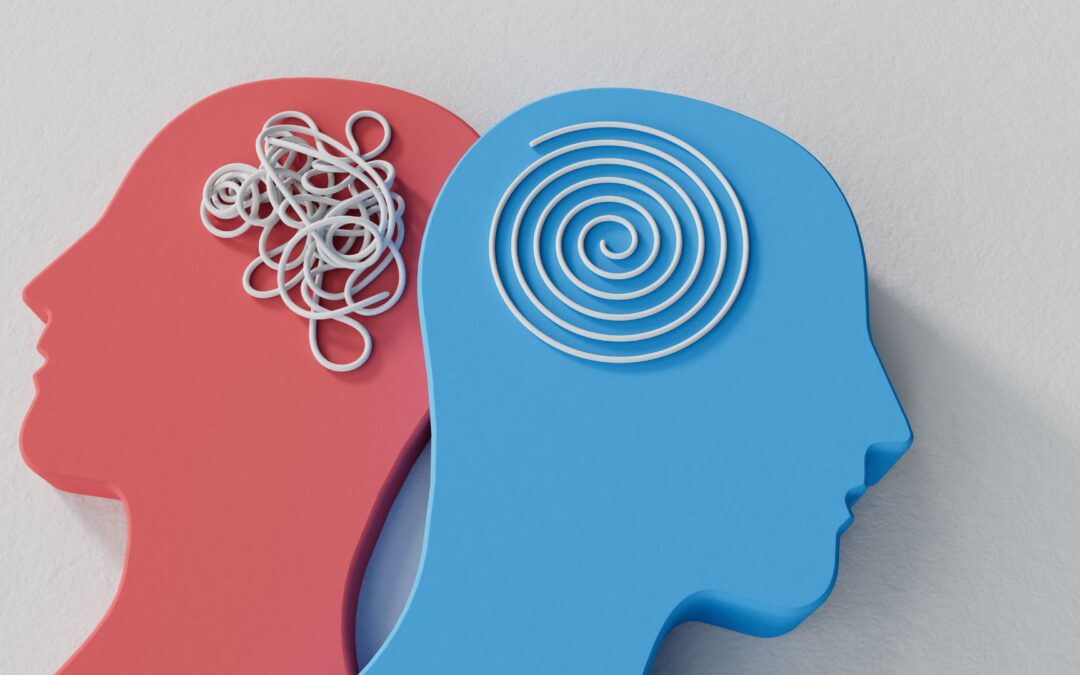loading...

by Tim Cassidy | Jul 19, 2024 | Certificate
Eye Movement Desensitization and Reprocessing (EMDR) therapy has proven to be a groundbreaking approach in trauma treatment and other psychological disorders.
And negative cognitions are central to this method. These are the deeply ingrained, often unconscious beliefs individuals hold about themselves. As a result, they can prolong distress and hinder healing.
Understanding and using negative biases within the EMDR framework allows therapists to improve therapeutic outcomes.

Read on to dig deeper into EMDR therapy and how you can harness it to provide better patient care.
What Is EMDR Trauma Therapy?
EMDR is a treatment that uses psychotherapy to enable individuals to recover from distressing, traumatic events. According to the American Psychology Association (APA), the therapy encourages the patient to concentrate on the trauma memory to let them move past their stressful situation.
What Are Negative Cognitions?
Negative cognitions are self-referential, negative beliefs individuals develop, usually as a result of traumatic experiences. These cognitions can manifest in various forms, such as “I am worthless,” “I am powerless,” or “I am unlovable.”
They reflect the individual’s internalized response to trauma and are often irrational and overly generalized. Despite their irrationality, these beliefs can have a powerful hold on a person’s psyche, affecting their emotions, behaviors, and overall mental health.
EMDR Counseling Associates identifies the feelings below as negative beliefs:
- I don’t deserve love.
- I am a bad person.
- I am terrible.
- I am worthless (inadequate).
- I am shameful.
- I am not lovable.
- I am not good enough.
- I deserve only bad things.
What’s the Role of Negative Cognitions in EMDR Therapy?
In EMDR therapy, identifying and addressing negative distortions is a critical step. This is because you need to help the patient reprocess them, guiding them through the therapeutic process.
Also, therapists can allow clients to confront traumatic memories and replace negative thinking with more adaptive, positive beliefs.
How To Identify Negative Biases
The therapist and the client should work together to identify negative cognitions. For example, you can use various techniques to uncover these beliefs, such as direct questioning, exploring the client’s narrative, and examining their emotional responses to specific memories or situations.
You should also create a safe and supportive environment to let the clients explore their thoughts and feelings without judgment. For example, if the clients are feeling uncomfortable discussing a particular issue, you can give them time to pause and take a break before continuing the conversation.
How to Uncover Negative Cognitions: 3 Techniques?
Discovering negative biases can be challenging, as they are often deeply ingrained and unconscious. However, several techniques can be helpful in this process:
The Float Back Technique
The Float Back Technique is a powerful tool to identify negative cognitions linked to specific traumatic memories. This method involves asking the client to focus on a current distressing situation and then “floating back” to earlier memories that elicit similar feelings.
This approach helps therapists find out about the original traumas and the negative beliefs that stem from them.
Cognitive Interweave
Cognitive interweave involves integrating cognitive restructuring into the EMDR process. Therapists can introduce alternative, more adaptive thoughts during the reprocessing phases to challenge and change negative thinking. This technique allows clients to develop new perspectives and weaken the hold of irrational beliefs.
Mindfulness and Body Awareness
Encouraging clients to practice mindfulness and body awareness can also reveal negative distortions. They can become more aware of the underlying beliefs driving their distress by paying attention to bodily sensations and emotional responses.
How To Address Negative Cognitions in EMDR Therapy
Once you have identified negative cognitions, the next step is to address and reprocess them. EMDR therapy involves eight phases, each helping resolve traumatic memories and change negative beliefs.

History Taking and Treatment Planning
During the initial phase, therapists gather detailed information about the client’s history, including traumatic experiences and presenting issues. This stage also involves identifying the negative beliefs and developing a treatment plan tailored to the client’s needs.
Preparation
For this step, practitioners educate clients about the EMDR process, establish a therapeutic alliance, and teach self-soothing techniques to manage distress. It ensures patients feel safe and ready for the reprocessing work.
Assessment
In the assessment phase, clinicians identify the specific traumatic memory to target and the associated negative cognition. They also establish a positive perception that the client would prefer to believe. For example, if the negative cognition is “I am powerless,” the positive belief might be “I am in control.”
Some more examples include:
RESPONSIBILITY/ I DID SOMETHING “WRONG”
| Negative Thinking |
Positive Thinking |
| I should have done something. |
I did the best I could. |
| I did something wrong. |
I learned (can learn) from it. |
| I should have known better |
I do the best I can (I can learn). |
Source
Desensitization
Desensitization involves processing the traumatic memory while simultaneously focusing on bilateral stimulation (BLS), such as eye movements, taps, or tones. This reduces the emotional intensity of the memory and weakens negative cognition.
Installation
Installation strengthens the positive cognition identified in the assessment phase. Clients focus on positive beliefs while engaging in BLS. It allows the new thinking to become more deeply ingrained.
Body Scan
During the body scan phase, clients are asked to focus on their physical sensations while thinking about their traumatic memory and positive cognition. This step helps identify any residual distress and reinforces the integration of the new belief.
Closure
Closure ensures clients leave each session feeling stable and safe. Practitioners guide patients through self-soothing techniques and grounding exercises and review progress during the session.
Reevaluation
Reevaluation occurs at the beginning of each subsequent session. Clinicians assess the client’s progress, determine if the targeted memory has been fully processed, and decide on the next steps in treatment.
Empower Yourself with Evidence-Based EMDR Therapy
If you want to advance your career in EMDR, Online CE Credits is a gold mine of on-demand CEU courses available online 24/7. The training programs, instructed by seasoned therapists, offer actionable insights from decades of experience. Here are examples of EMDR therapy certifications:
- Advanced EMDR Skills for Complex Trauma
- EMDR for Anxiety: Basic EMDR Skills and Anxiety Modifications
- EMDR Skills: Practical Modifications for Children & Other Populations
- Integrative Advanced Workshop: EMDR, Ego States, IFS
- Must-Have EMDR Skills for Online Therapy (even if you aren’t trained in EMDR!)
How to Improve EMDR Therapy Through Creative Interventions
While the standard EMDR principles are effective, incorporating creative interventions can boost the therapeutic process. These strategies help patients engage more deeply with their negative perceptions and simplify the reprocessing work.
Art Therapy Techniques
Art therapy techniques provide clients with alternative ways to express and explore their negative cognitions. Through drawing, painting, or sculpting, clients can externalize their beliefs and gain new insights. Art therapy can also be integrated into the desensitization phase, using creative activities as a form of bilateral stimulation.
Narrative Therapy Approaches
Narrative therapy approaches can complement EMDR by helping clients re-author their stories. They can create new, empowering stories about their lives by identifying and challenging the dominant narratives driven by negative cognitions.
This process is effective in the installation phase, reinforcing positive beliefs through the re-authoring of personal narratives.
Somatic Experiencing
Somatic experiencing focuses on the body’s response to trauma and can be used alongside EMDR to address negative cognitions. Counselors can encourage the release of trauma stored in the body by helping clients become more attuned to their bodily sensations This approach strengthens the body scan phase and promotes holistic healing.
Why Therapist Competence and Client Readiness Are Important?
The success of EMDR therapy in addressing negative cognitions relies heavily on the therapist’s competence and the client’s readiness. Health professionals must be well-versed in EMDR techniques and understand trauma and its impact on cognition. They should also possess strong skills in creating a safe, empathetic therapeutic environment.
Client readiness is equally crucial. Patients should be emotionally stable and familiarize themselves with coping resources before engaging in EMDR therapy. For example, pre-treatment preparation may involve stabilization techniques, psychoeducation, and supportive therapies.
Unearth Negative Distortions in EMDR Therapy
Understanding and using negative biases within EMDR therapy is a powerful approach to healing trauma and promoting psychological well-being. Practitioners can help clients transform their self-perception and lead healthier, more fulfilling lives by identifying, addressing, and reprocessing deeply ingrained beliefs.
Dominate Your EMDR Therapy Field with Online CEUs
Whether a beginner or an expert in EMDR Therapy, Online CE Credits offers expert-driven training programs to meet your needs. You can select from over 250 accredited certifications. The best part? You can finish the lessons at affordable rates and at your own pace. Stop losing clients to clinicians with specialized skills. Get cutting-edge training to expand your service offerings.

by Tim Cassidy | Jul 19, 2024 | Certificate
Mental health specialists should earn continuing education units (CEUs) to provide clients with the best possible care. Also, therapists must stay abreast of new methodologies, theories, and practices to advance their careers.
For these reasons, mindful CEUs offer a unique approach to professional growth. Integrating mindfulness practices can improve therapeutic skills while promoting self-care.

Here’s what you need to know:
What Is Mindfulness in Therapy?
Mindfulness, or mindfulness-based cognitive therapy (MBCT), is the practice of being present and fully engaged in the moment without judgment.
Also, ScienceDirect.com says:
Mindfulness-based therapies use meditation, relaxation, and awareness exercises to help focus on the present moment, aiming over time to experience day to day situations and stressors in nonjudgmental and non-reactionary ways.
Why Is Mindfulness Important for Therapists?
Incorporating mindfulness into CEUs deepens your therapeutic skills. Here’s how:
Enhancing Therapeutic Process
Emotion regulation describes a person’s ability to effectively manage and respond to an emotional experience. So mindfulness training can help you manage your own emotions more effectively.
You can maintain a calm and centered presence during sessions by cultivating an awareness of your emotional states and reactions. Emotional regulation provides a stable and supportive environment when dealing with clients’ intense emotions.
Enhanced Empathy and Attunement
Mindfulness practices encourage you to tune into your clients more deeply. This understanding allows therapists to pick up on subtle cues and non-verbal communication. As a result, it fosters a strong therapeutic partnership.
Clients feel more understood and valued, which can significantly improve therapeutic outcomes.
Increased Focus and Presence
Effective therapy depends on a therapist’s ability to stay present. Mindful CEUs train you to sustain your focus and stay fully engaged with your clients. This presence lets you better grasp the client’s issues and models mindfulness for patients, encouraging them to develop similar skills.
Promoting Self-Care and Preventing Burnout
The Society for the Advancement of Psychotherapy says practitioners often face high levels of stress and emotional exhaustion, which can lead to burnout. Mindful CEUs place a strong emphasis on self-care, equipping therapists with tools to manage stress and maintain their well-being.
Stress Reduction
Mindfulness practices, such as meditation and deep-breathing exercises, are effective tools for stress reduction. Regular practice enables you to lower your stress levels, which can improve your overall quality of life and professional performance.
Increased Self-Awareness
Self-awareness is an integral part of mindfulness. You can become more aware of your own needs, boundaries, and limits by engaging in mindfulness training. This self-awareness allows you to implement effective self-care strategies and prevent burnout.
Enhanced Resilience
Mindfulness cultivates resilience by helping therapists develop a balanced perspective on challenges and setbacks. You can learn to approach difficulties with a non-judgmental attitude. And this can reduce the stress’s impact and let you bounce back from adversity.
Improving Client Outcomes with Mindful Interventions
Clients benefit significantly when therapists integrate mindfulness into their practice. Mindful interventions can lead to improved client outcomes in various ways.

Reduction in Anxiety and Depression
The National Institute of Mental Health says mindfulness-based interventions (MBIs) have been shown to reduce anxiety and depression symptoms.
You can provide your patients with practical tools to manage their mental health if you teach mindfulness techniques. These approaches empower clients to regulate their emotions, reduce rumination, and cultivate a sense of inner peace.
Improved Emotional Regulation in Clients
Clients who practice mindfulness learn to observe their thoughts and emotions without getting overwhelmed by them. This improved emotional regulation can lead to healthier coping mechanisms and better overall mental health.
Enhanced Therapeutic Relationship
Successful therapy relies heavily on the therapeutic relationship. You can bring a heightened sense of presence and empathy into sessions when you practice mindfulness. Clients often feel more connected and understood, which strengthens the therapeutic alliance and promotes positive outcomes.
How To Introduce Mindfulness to a Client
Integrating mindfulness into therapy involves more than just teaching clients meditation techniques. It requires therapists to embody mindfulness in their professional practice.
Mindful Listening
Mindful listening involves giving full attention to the client without distractions or preconceived judgment. By practicing mindfulness, you can create a safe space for clients to express themselves honestly.
Psychology for Today recommends the following mindfulness listening tips:
- Listen beyond the words: Pay attention to nonverbal cues like body language, voice tone, and silence.
- Focus on the “here and now”: Gauge the client’s presence in the present moment.
- Be aware of your own reactions: Observe your own thoughts and feelings triggered by the client to ensure unconditional acceptance.
- Practice deep listening: Listen not just to the client’s words, but also to their unspoken feelings, beliefs, and assumptions.
Mindful Reflection
You can also use mindfulness to reflect on your practice and interactions with clients. This reflection helps identify areas for improvement and promotes continuous professional growth. It also enables you to align with your clients’ needs and goals.
Mindfulness-Based Therapies
Therapists can integrate mindfulness-based therapies, such as Mindfulness-Based Stress Reduction (MBSR) or Mindfulness-Based Cognitive Therapy (MBCT), into their practice. These evidence-based approaches combine traditional therapeutic techniques with mindfulness practices, offering clients comprehensive support.
How Do I Practice Mindfulness as a Therapist?
Incorporating mindfulness into daily routines can be transformative for clinicians. Here are several mindful techniques you can practice daily to enhance your professional and personal well-being.
Mindful Breathing
One of the simplest and most effective mindfulness techniques is mindful breathing. Take a few minutes each day to focus on your breath. Inhale deeply through your nose, hold for a few seconds, and exhale slowly through your mouth. This practice helps ground you in the present moment, reducing stress and promoting a sense of calm.
Body Scan Meditation
The body scan meditation involves paying attention to different parts of your body, starting from your toes and moving up to your head. Notice any sensations, tension, or discomfort without judgment. This approach enhances body awareness and helps release physical tension, promoting relaxation and mental clarity.
Mindful Walking
Transform your daily walk into a mindfulness practice. Pay attention to the sensation of your feet touching the ground, the rhythm of your steps, and the surrounding environment. Mindful walking helps clear your mind, reduce stress, and increase your connection with the present moment.
Gratitude Practice
Begin or end your day with a gratitude practice. Take a few moments to reflect on three things you are grateful for. This simple exercise shifts your focus from what’s lacking to what’s abundant in your life, developing a positive mindset and emotional well-being.
Mindful Eating
Mindful eating involves paying full attention to the experience of eating and drinking. Utah State University says it’s about wellness and how we eat, not what we eat. So notice the colors, smells, textures, and flavors of your food.
And the Harvard School of Public Health states that mindfulness eating can improve an individual’s psychological well-being. Eating mindfully can improve digestion, reduce overeating, and increase your enjoyment of meals, making it a valuable self-care practice.
Progressive Muscle Relaxation
Progressive muscle relaxation (PMR) is a technique where you tense and then slowly release different muscle groups in your body. Start with your feet and work your way up to your head. This practice reduces physical tension and promotes relaxation, making it an excellent tool for stress management.
Mindful Journaling
Spend a few minutes each day writing in a journal. Reflect on your thoughts, feelings, and experiences without judgment. Mindful journaling helps process emotions, gain insights, and track your progress, contributing to emotional regulation and self-awareness.
Loving-Kindness Meditation
Loving-kindness meditation involves silently repeating phrases of goodwill and compassion towards yourself and others. For example, “May I be happy, may I be healthy, may I live with ease.” Extend these wishes to loved ones, acquaintances, and even difficult individuals. This technique builds empathy, compassion, and emotional resilience.
Mindful Stretching
Incorporate mindful stretching into your daily routine. Pay attention to the sensations in your muscles as you stretch, breathe deeply, and move slowly. Mindful stretching increases flexibility, reduces tension, and promotes a sense of physical well-being.
Digital Detox
Set aside specific times each day to disconnect from digital devices. Use this time to engage in mindfulness practices, connect with loved ones, or spend time in nature. A digital detox reduces screen-induced stress and enhances your ability to be present.
You can cultivate a more mindful approach to life and work by integrating these mindful techniques into your daily routine.
How To Choose the Right Mindful CEU Program
Be sure to consider the following factors when selecting mindful CEUs to meet your professional and personal development needs:
Accreditation and Quality
Ensure the program is accredited and recognized by relevant professional bodies. Experts in mindfulness and mental health frequently design and teach high-quality programs.
Relevance to Practice
Choose a program that aligns with your therapeutic approach and the client’s needs. For example, opt for courses with practical techniques you can integrate into your practice effortlessly.
Support and Community
Support from like-minded professionals and ongoing support can enhance the learning experience. Peer support and collaboration can also provide additional insights and motivation.
Boost Your Credentials and Knowledge with Online CEUs
As you consider mindfulness in your professional practice, it’s a great idea to advance your skills in other areas. For example, Online CE Credits provides over 250 accredited programs, covering extensive topics in psychotherapy. Whether it’s a course on complex trauma, anxiety, depression, addiction, EMDR therapy, or Cognitive Processing therapy, you’re covered.
Wrapping Up: Embrace Mindfulness Techniques
Mindful CEUs offer a multifaceted approach to continuing education for therapists. They enhance your therapeutic skills, promote self-care, and improve client outcomes. Integrating mindfulness into your professional practice can let you achieve a balanced and fulfilling career while providing exceptional care to your clients.
Ready to upgrade your career and fulfill your licensure requirements? Online CE Credits is here to help you.
All our training programs are available online 24/7, and you can complete them anywhere, anytime. And the good news is that you can have direct access to seasoned therapists and up-to-date information. Stop settling for outdated mental health practices. Get evidence-based training to transform your clinical skills.

by Tim Cassidy | Jul 16, 2024 | Certificate
Studies show that domestic violence has a complex nature and far-reaching impact. It demands continuous learning and updated knowledge to ensure practitioners provide the most effective support and interventions.
For these reasons, continuing education units (CEUs) allow mental health specialists to stay current with legal requirements. They also help you maintain licensure, enhance skills, and keep abreast of the latest research and best practices in domestic abuse.
Here’s what you need to know:

What Is Domestic Violence?
According to the United Nations, domestic violence is “a pattern of behavior in any relationship that is used to gain or maintain power and control over an intimate partner.”
Also called domestic abuse or intimate partner violence, it’s a pervasive issue that affects individuals across all demographics. However, WHO reports that nearly 1 in 3 (30/%) of women worldwide have experienced some form of domestic abuse.
And intimate partner violence involves physical, emotional, psychological, sexual, and financial abuse within relationships. The U.S. Justice Department identifies the acts below as domestic violence:
- Physical abuse includes beatings, slappings, shovings, grabbings, pinchings, bites, hair pullings, and other types of harmful physical contact.
- Emotional abuse is attacking an individual’s value or self-esteem, like name-calling.
- Psychological abuse includes scaring the victim by intimidation, threatening to harm them, their partner, children, family, or friends, and permanently damaging their property and pets.
- Sexual abuse is any form of coercion or attempt to coerce sexual contact or behavior without consent.
- Financial abuse is restricting access to economic resources to which someone is entitled.
- Technological abuse is the act of harming, threatening, controlling, stalking, harassing, impersonating, exploiting, extorting, or monitoring another person through the use of technology.
Why Mental Health Professionals Need To Understand Domestic Violence
Domestic violence dynamics are complex as they involve power and control by one partner over another. This dominance has grave consequences that affect the immediate victim, the children, extended family members, and the broader community.
For mental health practitioners, grasping domestic violence complexity is essential. You need up-to-date knowledge about the patterns of abuse, the psychological impact on victims, and the most effective therapeutic interventions.
As a result, online CEU courses offer an invaluable resource for gaining this knowledge. They let you stay current with emerging trends and evidence-based practices.
What’s the Role of CEUs in Professional Development?
As a licensed mental health therapist, CEUs are a requirement for professional development. They enable you to maintain a high standard of practice and remain knowledgeable about the latest developments in your work.
And if you’re working with domestic violence survivors, CEUs can help you recognize signs of abuse, understand the legal and ethical considerations, and use appropriate therapeutic strategies.
Online CEU programs are flexible and convenient for busy professionals to fulfill their continuing education requirements. These courses can fit around your demanding schedules, allowing you to study at your own pace and from any location.
What Are the Benefits of Online CEU Courses for Domestic Violence?

Accessibility and Convenience
You can access online CEU training programs from anywhere, making it easier to balance your professional and personal commitments. And advancing your skills becomes a breeze if you’re working in rural or underserved areas, where there’s limited access to face-to-face training.
Diverse Learning Materials
Online certifications incorporate various learning materials, including videos, case studies, and interactive modules. This enhances the learning experience and helps practitioners engage with the content in different ways.
Expert Instruction
Leading experts teach online CEU courses on domestic abuse. Because of the instructors’ wealth of knowledge and experience, learners can gain valuable insights and practical techniques for their practice.
Up-to-Date Information
Research in domestic violence and intervention is continually evolving. Clinicians can remain relevant with current information and best practices since online CEU course providers regularly update their training to reflect the latest findings.
Continuing Certification
By completing online CEU certifications, therapists can meet their state’s licensure requirements. This enables you to maintain your professional status’ credibility and legitimacy.
What Topics Do Domestic Violence CEU Courses Cover?
Online CEU programs for domestic violence explore a range of topics, each crucial for providing comprehensive care to survivors. These courses dig deeper into the following areas:
Understanding the Dynamics of Abuse:
Courses explore different forms of domestic violence, including physical, emotional, psychological, and financial abuse. They examine the power and control tactics used by abusers and the effect they have on victims.
Legal and Ethical Considerations:
Clinicians learn about the legal frameworks surrounding domestic violence, including mandatory reporting laws, restraining orders, and the rights of victims. Ethical considerations, such as maintaining confidentiality and navigating dual relationships, are also part of this course.
Trauma-Informed Care:
Because domestic violence has a profound impact on mental health, courses emphasize trauma-informed care. The training empowers professionals to recognize the signs of trauma, employ trauma-sensitive interventions, and create a safe and supportive therapeutic environment.
Cultural Competency:
Domestic violence affects individuals from all cultural backgrounds. As a result, the training highlights cultural sensitivity and competency. This helps counselors consider cultural factors in their assessments and treatments.
Intervention Strategies:
Mental health specialists gain practical skills on how to work with domestic violence survivors, including safety planning, crisis intervention, and long-term therapeutic approaches. Certifications may also cover group therapy techniques and the role of support networks.
Impact on Children:
Domestic violence has significant implications for children who witness or experience abuse. Programs address the psychological and developmental impact on children and provide methods to support child survivors and their non-abusive parents.
How To Upskill Yourself in Domestic Violence Therapy?
Online CE Credits is your trusted companion if you want to upgrade your knowledge and expertise in domestic abuse and interventions. It provides an in-depth training program on trauma treatment skills for survivors of domestic abuse and intimate partner violence.
Taught by a therapist with decades of experience, the course aims to:
- Enhance your understanding of the domestic violence spectrum
- Highlight its impact and long-term effects on survivors
- Explore interventions such as Power Threat Meaning Framework and Trauma Informed Practice, psychoeducation, and stabilization
Ultimately, the training program enables you to restore control over trauma symptoms and emotional regulation to allow for effective processing of the DA experiences.
You can also check out another vital certification in teen dating violence.
Enhance Your Professional Competence and Confidence
One of the primary benefits of engaging in online CEU courses is that it improves your professional competence and confidence. As you deepen your understanding of domestic violence, you become more adept at identifying signs of abuse. As a result, you can provide appropriate interventions, and advocate for clients.
This competence boosts your confidence to support survivors and make a meaningful difference in their lives.
Additionally, the knowledge gained from CEU courses allows you to stay informed about the latest research and trends in domestic abuse. This ongoing education is vital to adjust to new challenges and ensure therapeutic practices remain effective and relevant.
Build a Supportive Professional Network
Online CEU programs also offer opportunities for practitioners to connect with peers and experts. Many programs include discussion forums, webinars, and networking events where you can share experiences, ask questions, and gain support.
Building a supportive professional network provides space for collaboration, resource sharing, and professional growth.
Commit To Lifelong Learning with Online CE Credits
Staying certified and informed through online CEU courses shows you’re committed to lifelong learning and professional excellence. The knowledge and skills you get from domestic abuse courses enable you to offer the highest standard of care to support healing. And you can contribute to the broader effort to end domestic violence.
Online CE Credits lets you remain relevant and equipped with the latest tools and insights in intimate partner violence. This ongoing education advances your practice and reinforces your dedication to the well-being and safety of those you serve. Begin your online CE course today!
Grab This Golden Opportunity To Upgrade Your Expertise
Want to dominate your space in domestic violence therapy? Online CE Credits has a treasure trove of information on the emerging trends in domestic abuse. All the training programs are from experienced instructors with actionable insights. You can complete the lessons at your own pace since there are no due dates or deadlines.
And the payment plans are so flexible that you can have instant access to online CEU certification after choosing your payment method. Stop stressing about CEUs! Get affordable, convenient online courses for licensure renewal.
FAQs
How long is a domestic abuse course?
You only need to dedicate a few hours to complete the domestic violence CE course with Online CE Credits. You can finish the program anytime, anywhere.
What skills do you need to be a domestic abuse worker?
A domestic abuse worker should recognize signs of abuse, provide emotional support, and refer victims to appropriate resources. They should also know the laws and policies related to domestic violence.
What are the objectives of studying domestic violence?
Studying domestic violence helps to identify risk factors, understand the underlying causes, and develop strategies to prevent and respond to it. It also provides insight into how to support victims and prevent further harm.

by Tim Cassidy | Jul 9, 2024 | Certificate
The National Institutes of Health reports that six percent of Americans said they had disconnected from their mothers. In the same study, 26 percent stated they had experienced estrangement from their fathers. According to Psychology Today, factors such as traumatic events, emotional abuse, traumatic family events, and parental favoritism can lead to family separation.
Therapists need to develop therapeutic solutions to enable clients to heal from trauma and reconcile broken relationships. Reintegration therapy is one of the interventions mental health professionals can use to reunify family members and lead them on the path to recovery.
Here’s what you need to know:
KEY HIGHLIGHTS
- Therapists can use reintegration therapy to heal clients from trauma and reconcile broken families.
- Core principles of reintegration therapy include a holistic approach, empathy and compassion, trauma-informed care, collaboration, and empowerment.
- Mental health practitioners who receive reintegration therapy training receive theoretical orientation, assessment and diagnosis skills, therapeutic techniques, and peer support to support their clients.
- Reintegration therapy aims to reunify family members and promote healing through self-awareness, emotional regulation, and identity restoration, especially family estrangement and trust issues.
- Training in reintegration therapy equips mental health professionals with in-demand skills and knowledge that support their clients in regaining a healthy sense of self and building a stronger sense of community.
With this in mind, let’s explore how therapeutic integration programs can empower mental health specialists to address trauma effectively.
Learn more about our professional development courses.
What is Reintegration Therapy?
Reintegration therapy is an integral part of mental health treatment as it enables clients to integrate different aspects of their personality, memories, and experiences into a unified whole. This therapeutic approach benefits individuals with a lost sense of self due to trauma, personality, dissociative disorders, or significant life changes.
Also known as reunification therapy, it’s common in family therapy where affected parties (a child and a parent) want to reconcile and reestablish trust. It promotes healing through self-awareness, emotional regulation, and regaining a sense of identity.
For mental health professionals, reintegration therapy training programs provide the tools and techniques for effective client support. They:
- Enhance mental health experts’ understanding of the therapy’s underlying principles
- Equip them with practical skills and deepen their ability to empathize with clients’ experiences.
- Better facilitate the reintegration process, enabling clients to achieve greater psychological resilience and well-being
What Are the Core Principles of Reintegration Therapy?
Reunification therapy is grounded in several core principles that guide the therapeutic process. They include:
A Holistic Approach: Reintegration therapy considers the individual as a whole, that is, the interaction between mind, body, and emotions. This holistic view enables therapists to address the complex nature of fragmentation and promote comprehensive healing.
Empathy and Compassion: A key part of reintegration therapy is the therapist’s ability to provide a safe and empathetic environment. Compassionate understanding helps clients feel supported as they explore and integrate difficult aspects of their experiences.
Trauma-Informed Care: Therapists also need to adopt a trauma-informed approach since many clients seeking reintegration therapy have histories of trauma. This involves recognizing the trauma’s impact on the individual and ensuring therapeutic interventions do not retraumatize the client.
Collaboration and Empowerment: Reunification therapy works perfectly if there’s collaboration between the therapist and the client. Clients should participate in their healing process to foster long-term resilience and independence.
Mental health experts can create a therapeutic environment to encourage reintegration so clients can build a stronger, more stable sense of self.
What Are Reintegration Therapy Training Programs’ Key Parts?
Typically, reintegration therapy training programs provide a broad range of theoretical and practical elements. They include:
Theoretical Foundations: Mental health specialists must have a robust theoretical understanding of reintegration therapy for effective practice. So training programs often begin with an overview of the key theories and concepts, such as:
Assessment and Diagnosis: This enables therapists to tailor reintegration therapy to each client’s needs. Training sessions teach mental health practitioners how to identify signs of fragmentation, dissociation, and trauma-related issues and how to develop appropriate treatment plans.
Therapeutic Techniques and Interventions: Participants learn various therapeutic techniques and interventions, such as grounding exercises, mindfulness practices, and integrative therapeutic modalities that help clients reconnect with disowned parts of themselves.
Supervision and Peer Support: Regular supervision sessions provide trainees with the opportunity to discuss challenging cases, receive feedback, and refine their skills. Peer support groups foster a sense of community and shared learning among participants, enhancing their professional development.
Ultimately, reunification therapy training certifications provide mental health professionals with in-demand skills to support their clients’ journeys toward reconnection and healing.
Want to jumpstart your therapy with neuroscience-based approaches to trauma? Online CE Credits offers expert-driven accredited certifications to deepen your understanding of trauma and its treatments. Stop wondering if you’re on the right path; get the path!

How Does Reintegration Therapy Training Benefit Mental Health Specialists?
Participating in reintegration therapy training programs offers numerous advantages for mental health counselors. These benefits include:
Enhanced Clinical Skills: Training programs equip therapists with a robust set of clinical skills they can apply across various therapeutic contexts. The specialized techniques and interventions learned during training empower practitioners to address complex cases involving trauma and dissociation.
Increased Confidence and Competence: Gaining expertise in reintegration therapy boosts therapists’ confidence to support clients through challenging therapeutic processes. This increased competence translates to more effective and impactful therapy sessions.
Professional Growth and Development: Engaging in advanced training initiatives contributes to ongoing professional growth. Therapists expand their knowledge base, stay updated on the latest research and best practices, and develop a deeper understanding of human psychology’s complexities.
Improved Client Outcomes: Ultimately, reintegration therapy’s primary training goal is to improve client outcomes. By mastering its principles and techniques, mental health professionals can more effectively guide clients toward greater psychological integration and overall well-being.
These benefits show the value of reintegration therapy training for mental health service providers, fostering professional and personal growth.
What Are the Specializations Within Reintegration Therapy?
Reintegration therapy includes several specializations that mental health practitioners can pursue. These areas of expertise allow them to customize their practice for specific client needs and contexts. And this boosts the overall success of their therapeutic interventions.
Family Reintegration Therapy
One significant specialization is family reunification therapy. This approach focuses on helping families manage the complexities of reintegration after separation or significant trauma. Family members often struggle to reconnect and rebuild their relationships due to either military deployment, incarceration, or long-term hospitalization.
Training in family reintegration therapy offers counselors strategies to address these challenges and foster communication, understanding, and emotional closeness within the family unit. Techniques such as family systems therapy, attachment-based interventions, and trauma-informed practices are integral to this specialization.
Individual Reintegration Counseling
Another critical area is individual reintegration counseling. This training zeroes in on helping clients integrate fragmented aspects of their identity and experiences on a personal level. Reintegration counselors work with individuals who have undergone significant life changes, experienced trauma, or struggled with dissociation.
Reintegration counseling courses emphasize personalized therapeutic approaches. And they include:
These skills enable therapists to support clients in achieving a cohesive sense of self and improving their overall mental health.
Community Reintegration Programs
Reunification therapy also extends to community reintegration programs. These lessons help individuals re-enter their communities after experiences such as incarceration, military service, chronic illness, injury, or rehabilitation. Participants learn the unique challenges individuals face during the reintegration process, such as stigma, social isolation, and systemic barriers.
Also, counselors develop and implement support programs to ensure successful community reintegration. A few priorities for reincorporation into society are social connectivity, employment opportunities, and access to resources.
What’s the Role of a Reintegration Counselor?
A reintegration counselor guides clients through the recovery process. This role requires a unique blend of empathy, expertise, and practical skills to effectively support clients in their journey toward psychological and emotional integration.
Client Assessment and Goal Setting
A reintegration professional must conduct thorough assessments to understand the client’s needs, history, and current challenges. This involves gathering information about the client’s background, experiences, and any previous trauma or dissociation.
Based on the evaluation, the counselor collaborates with the client to set realistic and achievable goals for therapy and a clear roadmap for the therapeutic process.
Developing Tailored Interventions
Therapists should also develop and implement tailored interventions that address each client’s specific needs. These approaches may include:
Cognitive-behavioral techniques to challenge negative thought patterns
- Mindfulness exercises to enhance present-moment awareness
- Grounding techniques to manage dissociative symptoms
- The goal is to upskill clients with practical tools they can use to cope with their daily lives and promote lasting psychological integration.
Providing Ongoing Support
The reintegration process can be lengthy and challenging, requiring ongoing support from the counselor. Regular therapy sessions with consistent check-ins and follow-ups help clients feel supported throughout their journey. Reintegration professionals also provide crisis intervention when necessary, enabling clients to manage acute stress or trauma-related reactions.
Collaborating with other Professionals
Effective reintegration therapy often involves collaboration with other practitioners, such as psychiatrists, social workers, and occupational therapists. Reintegration therapists work as part of a multidisciplinary team to provide comprehensive care to address the various aspects of the client’s well-being. This team-based approach ensures clients receive holistic support tailored to their unique needs.
How Reintegration Therapy Training Advances Your Career
For mental health professionals, investing in reintegration therapy training can significantly advance their careers. Specialized training enhances clinical skills and opens new professional growth and development opportunities.
Expanding Your Client Base
By gaining expertise in reintegration therapy, therapists can attract a range of clients seeking specialized support. Whether working with individuals, families, or communities, trained reintegration counselors can offer valuable services that meet complex psychological needs. This specialization can make therapists stand out in a competitive field, making their practice more appealing to potential clients.
Professional Recognition and Credibility
Completing advanced training programs and earning certifications in reintegration therapy improves professional recognition and credibility. Clients and colleagues may recognize the dedication and expertise required to specialize in this area. This recognition increases referrals, collaborative opportunities, and a stronger professional reputation.
Continuing Education and Lifelong Learning
The field of reintegration therapy is continuously evolving, with new research and best practices emerging regularly. Engaging in ongoing continuing education ensures therapists stay updated on the latest developments. And this refines their skills and expands their knowledge base. This commitment to lifelong learning is essential to providing the highest quality care to clients.
Personal Fulfillment and Impact
Additionally, specializing in reintegration therapy offers personal fulfillment while positively impacting clients’ lives. Helping individuals and families handle reintegration challenges and achieve a unified sense of self is profoundly rewarding. Therapists can take pride in promoting healing and transformation, resulting in a client’s overall well-being.
Resources for Reintegration Therapy Training
Various training resources can help mental health professionals kickstart their specialization in reintegration therapy. Here are some examples:
Look for accredited training programs that offer comprehensive courses in reintegration therapy. These programs often provide a blend of theoretical knowledge, practical skills, and supervised clinical practice.
Join professional organizations dedicated to reintegration therapy. This can provide valuable networking opportunities, access to resources, and ongoing education.
And for those seeking flexibility, online courses and webinars offer a convenient way to gain specialized knowledge in reintegration therapy.
Upgrade Your Skills in Trauma Treatments
Reintegration therapy can be successful if therapists embrace a trauma-focused approach to avoid re-traumatizing the affected parties. For this reason, enrolling in expert-driven CEU courses can improve mental health professionals’ interventions on trauma-related issues.
Online CE Credits has comprehensive, affordable training certifications in complex trauma, PTSD, and other mental disorders, available online 24/7.
Ready to hone your skills? Set up your account today!

by Tim Cassidy | Jul 9, 2024 | Certificate
Statista reports that 22 million people used digital technologies for therapy in 2020, and this is expected to rise to 652 million in 2025 worldwide. Also, 20 percent of adults in the U.S. live with some form of mental health condition.
So therapeutic technologies like mobile health apps are needed more than ever to provide accessible, real-time mental health interventions. And mental health professionals should stay current with these advancements through online courses.
Here’s what you need to know:
Key Highlights
1. Therapeutic technology is in high demand due to the increasing need for accessible mental health interventions.
2. Online courses in therapeutic technology offer a convenient and affordable way for mental health specialists to improve their skills and stay updated with industry trends.
3. Therapeutic technology encompasses teletherapy platforms, mobile health apps, virtual reality therapy, artificial intelligence, and machine learning tools.
4. Continuing education in therapeutic technology is essential for staying current with best practices.
5. Online CE Credits offers diverse certification programs managed by therapists and available online 24/7 at a fraction of the cost, without due dates or deadlines.
6. Continuing education helps therapists stay relevant by keeping them up-to-date with the latest tools and methodologies and providing hands-on training.
Now, let’s dig deeper into digital technologies for therapy to help you level up your knowledge and expertise.
What Are the Types of Therapeutic Technology?
Therapeutic technology covers a range of tools and applications that support and enhance mental health treatment. Here are some examples:
Teletherapy Platforms
Teletherapy, also called online therapy, e-counseling, or e-therapy is when you offer mental health services and client support over the Internet. Health service providers can interact with clients through:
- Text messaging
- Online chat
- Video conferencing
- Email
- Internet phone
- Messaging
It has become a mainstay in mental health services, especially since the COVID-19 pandemic. Platforms like BetterHelp, Talkspace, and Thera-LINK provide secure, user-friendly interfaces for remote sessions. This has made therapy accessible to individuals who might otherwise face barriers such as geographic distance or mobility issues.
Mobile Health Apps
As the name speaks for itself, mobile health apps enable users to connect with health professionals anywhere, anytime. For example, Headspace, Calm, and Moodpath offer clients tools for mindfulness, meditation, mood tracking, and cognitive-behavioral therapy (CBT) exercises.
The tools provide supplementary support between sessions, empowering clients to be active in their mental health management.

Virtual Reality (VR) Therapy
VR therapy employs virtual world technology in a computer-generated or 3-D environment to provide occupational or psychological therapy. VR therapy is also known as simulation for therapy (SFT), virtual immersion therapy (VRIT), virtual exposure therapy (VRET), or computerized CBT (CCBT).
It’s an emerging field that is believed to treat conditions like PTSD, anxiety disorders, and phobias. Tools like Limbix and Psious offer controlled, therapeutic environments where clients can confront and manage their symptoms in a safe space.
Artificial Intelligence (AI) and Machine Learning
AI-driven tools are also modifying diagnostic processes and personalized treatment plans. For example, AI chatbots can break down barriers like stigma, costs, therapist availability, and access.
And platforms like Woebot and Ellie (an AI therapist developed by the University of Southern California) provide automated, intelligent interactions that support clients and gather valuable data to inform human therapists.
Embrace Therapeutic Technologies
Wondering how you can take advantage of therapeutic technology to boost your skills in mental health treatments? You’re in luck. Online CE Credits has diverse certification programs that are therapist-managed and available online 24/7 at a fraction of the cost.
No due dates. No deadlines. All the lessons are self-paced, and you can complete them from the comfort of your home.
Why Continuing Education in Therapeutic Technology Is Essential
Because technological advancements change rapidly, mental health practitioners must commit to lifelong learning to stay relevant.
Here are key reasons why CE in therapeutic technology is vital:
Staying Current with Best Practices
New technologies continually emerge, each promising to improve therapeutic outcomes. CE courses ensure practitioners are up-to-date with the latest tools and methodologies. This enables them to integrate industry standards into their clinical work.
Enhancing Clinical Skills
Technological proficiency is becoming an essential skill set for therapists. CE courses provide hands-on training and practical knowledge, enabling therapists to incorporate new tools effectively into their practice. For example, certification programs like PTSD therapy and advanced EMDR can boost your skills in trauma-related cases.
Meeting Ethical and Legal Standards
Using technology in therapy raises unique ethical and legal considerations, such as confidentiality, informed consent, and data security. CE programs offer guidance on how to manage these issues, helping therapists maintain compliance with professional standards.
Improving Client Engagement and Outcomes
Technological tools can promote client engagement by providing interactive, user-friendly platforms for therapy. CE certification programs equip therapists with strategies to cash in on the tools’ therapeutic benefits for better client results.
What Are the Types of Online Courses?
Online CE courses in therapeutic technology are extensive, catering to various interests and specializations. Here are some popular courses:
Introduction to Teletherapy
These courses cover the basics of conducting therapy sessions online, including platform selection, setting up a virtual office, and managing technical issues. They also explore techniques to build rapport and maintain a therapeutic presence in a virtual environment.
Advanced Teletherapy Techniques
Building on introductory courses, these classes expand more on teletherapy, such as integrating multimedia resources, conducting group therapy online, and addressing specific clinical issues like trauma and anxiety in a virtual setting.
Mobile Health Applications
Courses on mobile health apps provide an overview of the most effective tools available, instructions on how to recommend and monitor their use, and strategies for integrating app-based interventions into treatment plans.
VR Therapy Training
These specialized courses teach therapists to use VR technology in clinical practice, including setting up VR equipment, selecting appropriate therapeutic scenarios, and monitoring client responses during VR sessions.
AI and Machine Learning in Mental Health
Courses in this area introduce therapists to AI-driven diagnostic and treatment tools. They cover topics like understanding machine learning algorithms, interpreting AI-generated data, and ethically integrating AI tools into practice.
Ethics and Legal Issues in Therapeutic Technology
These courses focus on unique ethical and legal challenges posed by therapeutic technology. Topics include maintaining client confidentiality in digital interactions, securing informed consent, and understanding the regulatory landscape.

What Are the Benefits of Online CE Courses?
Online CE courses offer numerous advantages, making them an attractive option for busy mental health therapists:
Flexibility and Convenience
Online programs allow therapists to learn at their own pace and on their own schedule. This flexibility benefits practitioners juggling busy caseloads and personal commitments.
Access to Expert Instructors
Online courses provide access to cutting-edge knowledge and insights from leading experts in the field. Participants can benefit from the expertise of renowned professionals without having to travel or take time off work.
Diverse Learning Formats
Internet courses often use various learning formats, including video lectures, interactive modules, discussion forums, and live webinars. This diversity caters to different learning styles and enhances the overall educational experience.
Networking Opportunities
Attendees have ample opportunities to network while doing online training. Discussion forums, live Q&A sessions, and group projects enable them to connect with peers and build professional relationships.
Cost-Effective Learning
Online programs are more affordable than in-person training since they eliminate travel, accommodation, and conference expenses. Many platforms also offer payment plans and financial aid options.
How Do I Choose the Right Online CE Course?
Selecting the right online CE course can be daunting with so many options. Here are some tips to help you make an informed decision:
Identify Your Learning Goals
Start by identifying what you hope to achieve from the course. Are you looking to master a specific technology, enhance clinical skills, or fulfill licensure requirements? Clear goals will guide your course selection.
Research Course Providers
Choose courses from reputable providers with a track record of delivering high-quality education. Look for accreditation by professional organizations and positive reviews from past participants.
Evaluate the Course Content
Review the course syllabus and content outline to ensure it covers the topics you’re interested in. Check for a mix of theoretical knowledge and practical applications, and look for opportunities to engage with instructors and peers.
Consider the Learning Format
Ensure the course format suits your learning style and schedule. If you prefer live interaction, look for courses with live webinars and Q&A sessions. If you need flexibility, opt for self-paced programs.
Check for Continuing Education Credits (CEU)
Ensure the course provides CE credits recognized by your licensing board. This is crucial for meeting licensure renewal requirements and ensuring the course is professionally valuable.
Jumpstart Your Mental Health Therapeutic Knowledge
Therapeutic technologies are here to stay and can upgrade your therapy skills faster and cheaper to enable you to better serve your clients. Thankfully, Online CE Credits offers a diverse, up-to-date therapeutic training program, catering to your individual needs as a busy mental health professional.
Our experienced experts cover topics in-depth, from teletherapy to AI-driven tools. They ensure you learn about the latest advancements and best practices in the field. Online CE Credits is your go-to resource for CEU in therapeutic technology because of its flexible learning formats, accredited CE credits, and practical, actionable content. Choose your course today!
Have You Signed Up For An Account?
Starting your journey toward earning an accredited CEU program in mental health is a breeze with Online CE Credits. You can pay in installments, make a once-off payment, or take on a membership plan. The best part? Individual fully-paid course bookings are 100% RISK-FREE for 24 hours, quality-guaranteed. Stop thinking you need more time to decide to upskill yourself. Create your account to get started!

by Tim Cassidy | Jul 9, 2024 | Certificate
Do you want to renew your psychology license without the stress of sifting through countless CE options?
Luckily, you can focus on what you do best—helping your clients—while confidently fulfilling your CE requirements with our hassle-free psychology license renewal programs.
Here’s what you need to know:
Key Highlights
1. Continuous education in psychology helps you adapt to mental health therapy changes and advance your skills in patient care.
2. Review your state’s specific requirements for psychology license renewal to avoid licensure lapses that disrupt your practice.
3. Online CE courses’ benefits include flexibility, diverse course offerings, expert instructors, cost-effectiveness, and interactive formats.
4. Choose an accredited online CE provider offering a range of courses, experienced instructors, and a user-friendly platform.
5. Keep records of completed CE activities, including certificates of completion, and submit renewal applications with the required fees on time.
Read on to discover how to satisfy your license renewal requirements while upgrading your counseling skills.
Why Continuous Education in Psychology Is Important
One study says continuous education (CE) allows healthcare professionals to adapt to society’s changes and to advance their skills and knowledge to offer optimal patient care.
So CE is more than a regulatory requirement; it’s a commitment to lifelong learning. This is because psychology is constantly evolving with new research, techniques, and ethical guidelines. CE courses enable psychologists to:
Stay Updated: Learn about the latest research findings, therapeutic techniques, and technological advancements.
Enhance Skills: Gain new competencies and refine existing skills to better serve clients.
Ensure Compliance: Fulfill state licensure requirements to maintain the validity of their professional licenses.
Expand Knowledge: Explore emerging areas of interest or specialty fields within psychology.
What You Need for License Renewal Requirements
Each state has its own specific requirements for license renewal, including the number of CE hours, the types of acceptable courses, and the frequency of renewal. Generally, the process involves:
Earning Required CE Credits: Psychologists must complete a designated number of CE hours within a specified period.
Documentation: Keep records of completed CE activities, including certificates of completion.
Renewal Application: Submit a renewal application along with proof of completed CE credits.
Fees: Pay any required renewal fees.
Don’t forget to find out your state’s specific requirements to avoid licensure lapses, which can disrupt your ability to practice.
What Are the Advantages of Online CE Courses?
Online CE training programs have become a popular choice among psychologists for several reasons. They offer flexibility, convenience, and access to a wide range of topics, making them an ideal solution for busy practitioners.

Flexibility and Convenience
Online CE certifications enable psychologists to learn at their own pace and on their own schedule. They’re perfect for those balancing a busy practice, family commitments, and personal interests. Mental health therapists can study during their most productive times since they can access material 24/7, anytime, anywhere.
Diverse Course Offerings
Online platforms provide an array of programs covering various psychology aspects, from clinical practice and ethical issues to new therapeutic techniques and special populations. This diversity helps psychologists choose courses that align with their interests and professional needs, improving their knowledge and practice.
Expert Instructors
Reputable online CE providers feature training programs from experienced and respected therapists in psychology. These instructors bring a wealth of knowledge and practical experience.
During seminars, attendees can gain insights into real-world issues that are theoretically sound and apply to the real world.
Cost-Effectiveness
Online CE courses are more affordable than in-person workshops or conferences. Additionally, they eliminate travel, accommodation, and other expenses associated with attending live events. Many online CE providers also offer package deals or subscriptions, providing further savings for multiple courses.
Interactive and Engaging Formats
Modern online CE certifications use different formats to enhance learning, including video lectures, interactive quizzes, case studies, and discussion forums. These engaging elements reinforce learning and ensure participants effectively apply new knowledge in their practice.
Accreditation and Quality Assurance
Trusted online CE providers run accredited programs that satisfy license renewal stringent standards. This accreditation guarantees high-quality courses whose credits are acceptable to state licensing boards.

How to Choose the Right Online CE Provider?
Finding the right online CE provider can be overwhelming since there are many. However, here are some key factors to consider when choosing a provider:
Accreditation
Be sure the provider is accredited by recognized organizations such as the American Psychological Association (APA) or state licensing boards. Accreditation confirms courses meet professional standards and can qualify for license renewal.
Course Offerings
Look for a provider that offers various psychology courses with several specialties. It becomes easy to find courses that match your interests and professional needs.
Instructor Expertise
Check the qualifications and experience of the course instructors. Ideally, they should be well-respected professionals with extensive experience in their respective fields.
User Experience
The platform should be user-friendly, with easy navigation and access to course materials. Additionally, look for features like progress tracking, automatic certificate generation, and customer support.
Reviews and Testimonials
Reading reviews and testimonials from other psychologists can provide valuable insights into the quality and effectiveness of the provider’s courses. Look for feedback on course content, instructor quality, and overall satisfaction.
Pricing and Value
Consider the cost of the courses and the value they provide. Ideally, a provider should offer competitive pricing, package deals, or subscription options Remember that the cheapest option is not always the best; quality and accreditation are paramount.
Start Your Journey to Continuing Professional Development
License renewal can be a hassle, but with the right approach and resources, it doesn’t have to be. Online CE courses offer a convenient, flexible, and effective way for psychologists to fulfill their CE requirements and stay ahead of the curve. Counselors can have a smooth, stress-free license renewal experience by choosing accredited, high-quality courses.
Embrace online learning in your professional development to continue providing the best possible care to your clients. Choose your online CE program today!
Have You Tried Online CE Credits?
Looking for a trusted provider? Online CE Credits offers extensive accredited courses from expert instructors. License renewal is a breeze because of the user-friendly platform and a commitment to quality. Stop searching for the perfect deal; enjoy an affordable membership plan now!
















